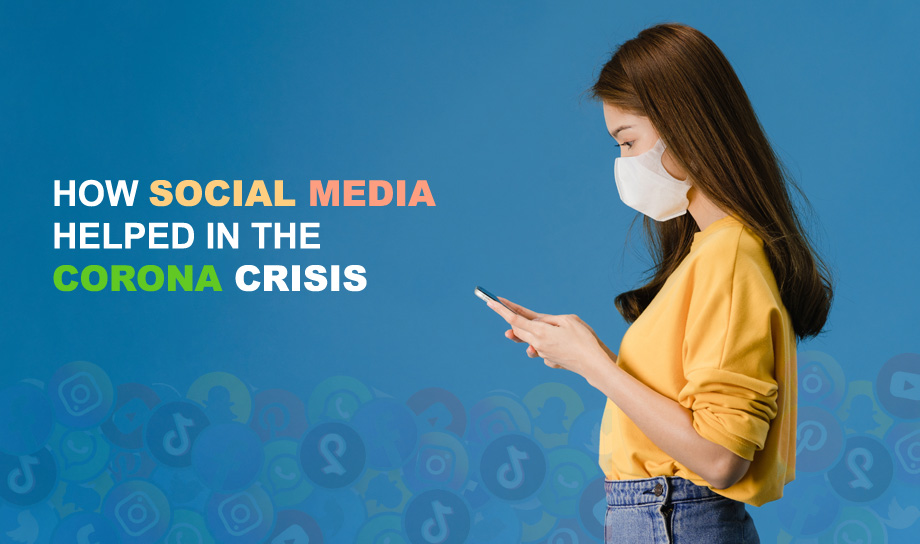The world is facing an extraordinary crisis that no one among us has experienced before. The COVID – 19 pandemic has changed the way we live, and no one can predict when the crisis will be entirely over. This epidemic also puts intensive pressure on healthcare, economic, and social structures.
Though, let’s not dive into the details of the virus as you are fully aware of the situation and know what measures to take. Let’s talk about what is happening on social media regarding the pandemic and whether it is beneficial or destructive.
During the crisis, we also realized how the spread of misinformation and lack of awareness has proved to be a threat to the public as much as the virus itself. Technologies and platforms like social media are meant to keep people connected, informed, and aware so they can keep themselves safe. But the same measures can also hamper the flow of information and jeopardizes efforts to control the pandemic.
What is the constructive role of social media during the COVID – 19 pandemics?
Social media proved helpful in informing the public about safety tips:
Many people approach the internet to seek health-related information. Helping people to know everything about the deadly virus is probably the most significant benefit of social media in these difficult times. We all know anything on social media gets viral within a few hours, which actually is proving beneficial in some ways considering the current situation.
Eventually, that’s how people first came to know about the virus and how it spreads and what all symptoms one can experience if infected by the coronavirus. People also learned what safety measures will keep them safe. Till now, on every other social media platform, we are constantly reminded to wash our hands, wear a mask and practice social distancing.
Many celebrities have also taken the initiative to educate the public by sharing their experiences with the situation. Some celebrities have shared their story of fighting the virus or about someone in their family or someone they know. This has proved beneficial as many people tend to believe such public figures more than even health care professionals and government.
So, when public figures and influencers take social media platforms to speak up, spread awareness about safety precautions, and share powerful messages on their profiles, people tend to listen.
Social media in preventing the spreading of fake news and misinformation:
As much as social media is efficient for spreading awareness and information, it’s also not immune to prevent the spreading of fake news. There were and still are many false facts, theories, data, and misinformation meant to distract the public and create panic.
Fortunately, many efforts were seen in this context, and many social media platforms like Facebook have joined hands with the World Health Organization to prevent the spreading of misinformation and maintain harmony. These platforms use more specific and advanced algorithms and filters to make sure it is only true, checked, and authentic news is available online.
This all has been possible due to social media, and it would have been impossible to find who is spreading the fake news without the help of social media.
Social media in organizing fundraisers:
In the past, many charitable organizations and non-profit organizations have maintained relationships with their donors through letters, mails, over the phone, or in person. But with the rise of social media platforms and more charitable organizations creating accounts on them, the tide shifted.
Today anyone willing to donate or help any cause can connect to any such concerned organization on the social media platform. Now, donors don’t have to put much effort into knowing when the next campaign is or if their money is going for a good cause. They can simply view any charitable organization page and stay connected.
In the current situation also, more fundraisers are organized to help people. People are helping hospitals by giving more personal protective equipment and people by providing necessary support. Many people are also helping those people who lost their job during the pandemic and local businesses who can’t afford to pay all their employees. Such people are provided with medicines and funds to support their families.
Many people have also come forward to help older people who are at greater risk and can’t go out on their own to buy groceries and medicines. And, all of this has become possible due to social media.
Social media in staff support and patient care:
The termination of physical interactions during this pandemic has changed how we practice patient-centered care, by providing in-person interaction. But with social media, HCWs can facilitate virtual communication between isolated and sometimes dying patients with their loved ones just by tapping into social media’s diverse tools either in the form of audio or text. This proved very comforting to patients and supporting their grieving friends and family.
Social media can also provide emotional support for frontline workers who face significant psychological distress due to social isolation, increased workload, concerns about infecting themselves, friends, and family members. Through social media, many health care workers spread positive messages by posting videos, audios, etc.
In response, people also motivated all the frontline professionals and shown appreciation which strengthened solidarity among the health care workers and the community.
Maintaining positive attitude:
We all need something to keep our minds busy during self-isolation and quarantine. Though now the situation might be better for some people but in the beginning days, social media helped many people feel less isolated.
Many brands and influencers came up with polls quizzes, contests, and challenges to keep everyone motivated and positive. These things helped people in killing time and learn more about the virus and how to stay safe at home.
Adverse effects of social media during COVID – 19?
The rapid outbreak of the corona virus has opened up various issues on social media platforms among Generation Z. Unfortunately, rumors, fake news, and false information spread faster on social media than reliable, fact-checked news. This affected the mental health of social media users and created a situation of panic.
Due to this panic, many people started to hoard essential things at home like sanitizers, masks, food items, and other stuff. This ultimately led to a shortage of supply of these goods, and those who really needed those items, couldn’t get any.
Where social media created awareness by informing people about the virus, it also created panic after a certain point. While dissemination of the significant risks of the virus to the public is appropriate, excessive disease-related information caused increased levels of stress, anxiety, and worry among the people.
Reports of an increasing number of positive cases, death data, loss of business, employment, illness, grief, etc., constantly reminded people of the devastations caused by the pandemic. This repeated sharing of disturbing news affected the mental health of some social media users to a great extent. People started to worry about getting infected by the virus even if they are not stepping out of the home.
Apart from the harm caused by excessive exposure of critical information to the public, social media has also led to the circulation of misinformation and fake news about the pandemic. From conspiracy theories to false remedies for a cure, you’ll see a lot of misinformation on social media about the coronavirus. With all this misinformation, people started to feel anxious and more stressed.
The WHO response to this ‘infodemic’ or “over-abundance of information that is partly accurate and partly not, makes it hard for people to find reliable guidance and trustworthy sources when they need it.”
Conclusion
There are still a lot of facts to consider before concluding whether social media helped combat the situation or made it worse. But with the scenario given, we can say their role is significant. Social media influence our responses both in a positive and negative way. We have to draw a line between what’s worth our attention and what’s not.
Social media was definitely not designed to affect our mental health adversely, but as we know, good things come with bad. To keep everything balanced, it’s advised that you should take a social media break once in a while to actually figure what’s going on around you. Our mental wellness matters the most and is really needed to combat the world crisis.

